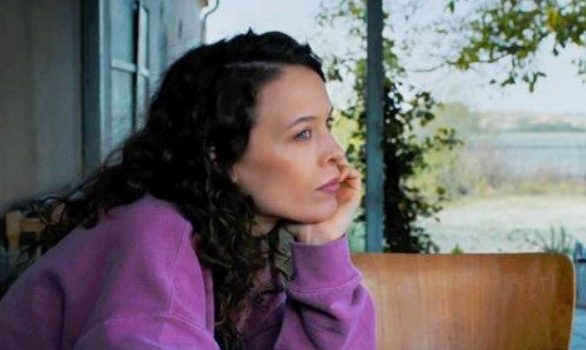Mirrors No. 3 – Film Review
Reviewed by Harris Dang on the 13th of June 2025
Madman Entertainment presents a film by Christian Petzold
Written by Christian Petzold
Produced by Florian Koerner von Gustorf, Anton Kaiser, and Michael Weber
Starring Paula Beer, Barbara Auer, Matthias Brandt, and Enno Trebs
Cinematography Hans Fromm
Edited by Bettina Böhler
Rating: TBA
Running Time: 86 minutes
Release Date: TBA
Mirrors No. 3’s premise involves Laura (Paula Beer), a rising piano student who suffers from an unexplained emotional crisis. Her musician boyfriend, Jakob, harangues her into undertaking a trip to the countryside with himself and his friends. As they reach the trip’s midway point, Laura’s moodiness kills the group’s enthusiasm. She asks Jakob to take her home and during the ride back, a tragic car crash instantly kills Jakob.
Miraculously, Laura is alive, unharmed, and taken in by Betty (Barbara Auer) who witnessed the crash. Over time, the two women bond and Laura comes to love life in the countryside and shows little interest in returning to her city life in Berlin. Even Betty’s husband, Richard (Matthias Brandt), and son, Max (Enno Trebs), welcome her with open arms. Over time, Laura gradually discovers the family is not who they say they are, which makes her question their motives.
Mirrors No. 3 is the latest film from acclaimed filmmaker Christian Petzold and marks his fourth collaboration with his lead actress Paula Beer. They have worked together on some amazing films, such as Transit (2018), Undine (2020), and Afire (2023). The majority of Petzold’s filmography has been well-received due to his understated, patient, concise, and elliptical storytelling and his ability to inject pathos with a subtle air of mystery. It can be difficult to realise how much one is swept up in the drama until the third act where these films throw their punches.
The same can be said for Mirrors No. 3. From the synopsis, the story sounds like a domestic thriller where Laura must escape from her captives. However, the proceedings are more elusive. Without revealing plot spoilers, the film is about grief, family disharmony, and existentialism. When we see how Paula affects the family and opens them up emotionally, the interactions range from endearing (Paula and Betty bond over housework) to terse (Max is very standoffish to Paula, despite her reticent advances), and enigmatic (the family interactions come across as vaguely sinister).
As with Petzold’s films, he never aims directly for melodrama. Like the characters themselves, Petzold wants his audience to take the air in, so to speak. To absorb the quiet moments in the sparse settings, which adds to the narrative’s mystery and the characters’ motivations. Mirrors No. 3 may not be politically charged like Phoenix or Transit or as dryly funny as Afire. Unlike Afire, which aimed for sharp humour at the expense of the character’s vulnerabilities, Mirrors No. 3 broods alongside them even though Petzold is smart enough to find humour in the situation.
Mirrors No. 3 is helped by the fantastic cast, who bring heart, humanity, and dignity to their characters, without resorting to histrionics. Matthias Brandt and Enno Trebs, both of whom starred in Afire, are compelling as the father and son. They are emotionally guarded and sceptical about Paula’s and Betty’s optimism. Barbara Auer (another repeat collaborator of Petzold) conveys the desperation and poignancy of Betty vividly through her eyes and physical performance.
Beer has the difficult task of being the audience’s proxy and the catalyst of the family’s narrative while appearing elusive about her emotional distress. Luckily, Beer achieves a striking grace and palpable magnetism, so her lack of character explanation is not a liability, but an asset. The lack of explanation works because it aligns with the cryptic storytelling. It also adds credence to the story’s conclusion that works as a reflective back-and-forth between characters.
Overall, Mirrors No. 3 is a smaller film from Christian Petzold since it lacks the heavy political themes and dramatic intensity of his earlier work. Nevertheless, Petzold still maintains his masterful hold in storytelling and manages to provide a beautifully wistful, contemplative, and heartwarming film that shows Paula Beer at her best. Recommended.
Summary: A beautifully wistful, contemplative, and heart-warming film that shows Paula Beer at her best. Recommended.









